As the Top 8 at Calling: Kansas City whittled down to its finals matchup, you'd be forgiven for lapsing enthusiasm. Day 2 had been an incredibly exciting broadcast as a diverse array of heroes had battled for those Top 8 seats. And as we cut to our top contenders, 5 different heroes punched their tickets. But that novelty proved to be fleeting, and in the final round we watched Gravy Bones face off against his reflection in a mirror match finale.
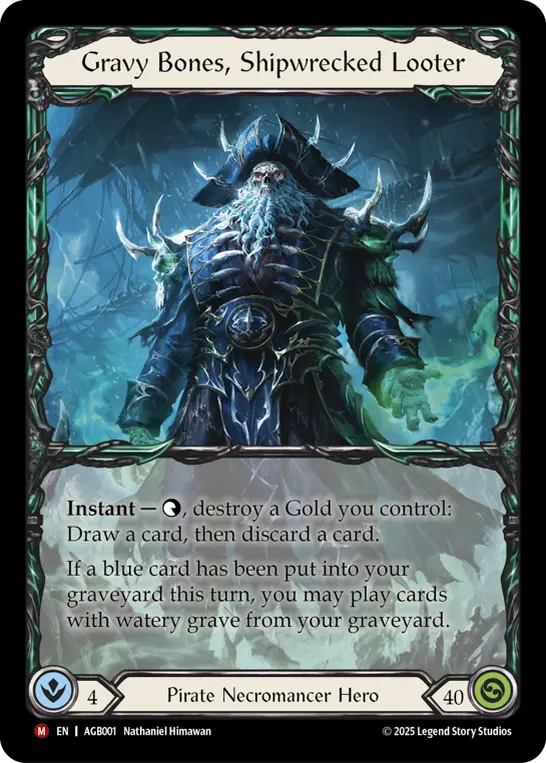
In a call-and-response older than the internet, this outcome was answered by the online FAB community with calls for Gravy to get hit by the next Banned and Restricted Announcement. Gravy Bones was obviously overpowered, many would argue, and his continued success in major tournaments (combined with the anecdotal popularity of the hero locally) was proof.
To be fair to their perspective, Gravy Bones is only the latest 'board state' hero in a storied lineage. Prior to Gravy, Enigma drew the ire of players for her ward auras; before that, Dromai's dragon allies reigned; and before that, Prism claimed the crown with phantasm auras. If you've been burned by on-board allies before, I can understand your distaste for Gravy's undead crew.


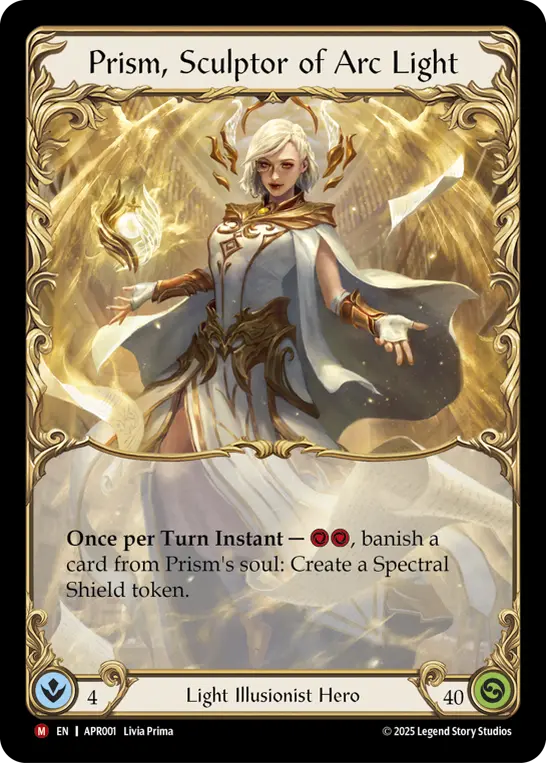
But I can't ignore the ubiquity of ire for the top deck at any given moment. When Gravy Bones isn't the target, Arakni, 5L!p3d 7hRu 7h3 cR4X is taking heat; before them, it was the heroes of Mistveil. Whenever Kano wins a major event, the outcry against his style of Wizard play begins anew. I don't need to innumerate the number of heroes who have been attacked for their position at the cutting edge of wide aggro.
We live in a constant cycle of hatred toward the heroes on top. But before we repeat the same patterns after Calling: Copenhagen this weekend, I ask you to pause and consider: can I find room in my heart for sympathy?
It's All About Popular
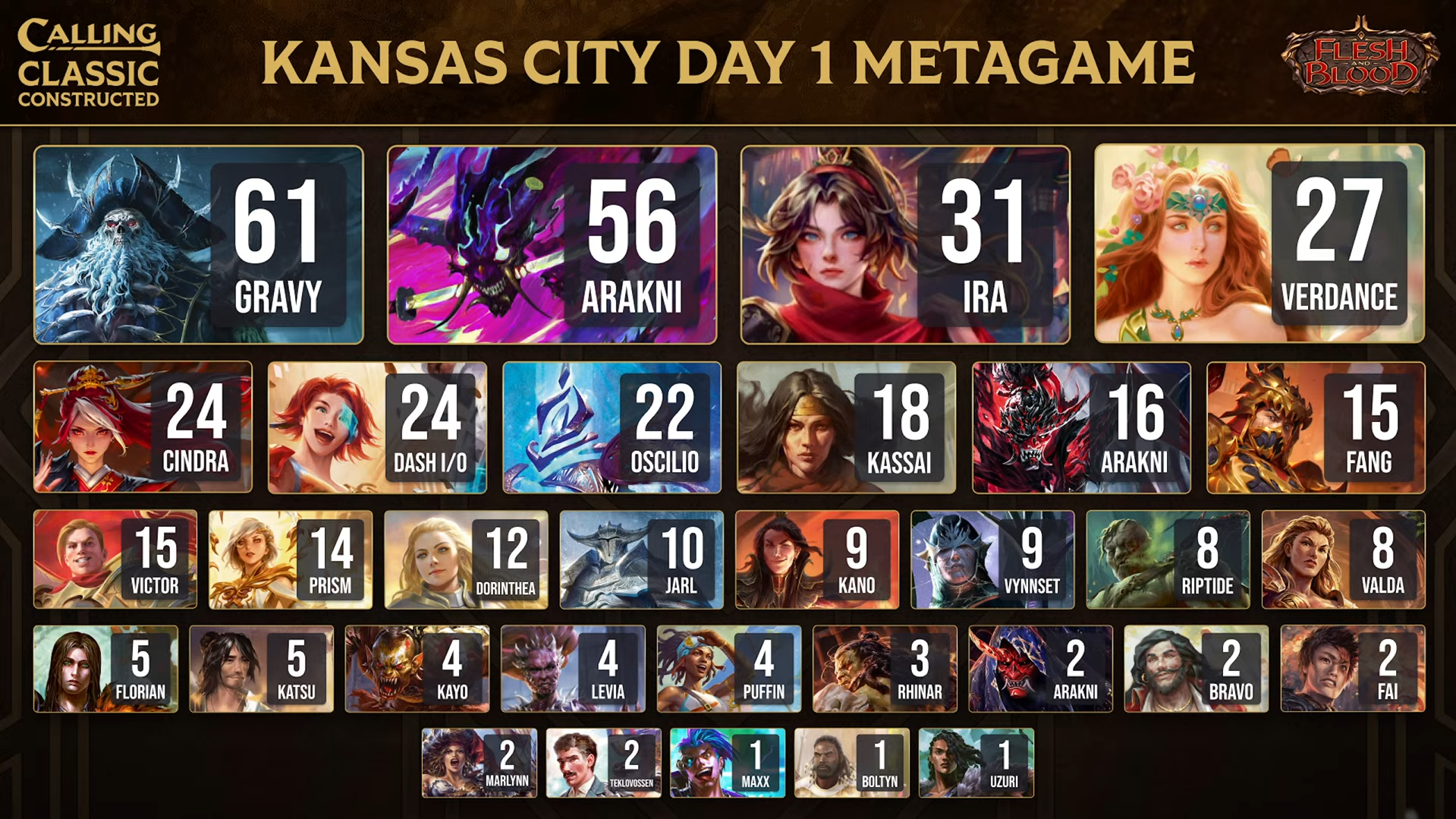
The meta breakdown for Kansas City's Calling illustrates an undeniable factor in any hero's tournament results: the more popular a hero is, the more chances they have to win the whole thing. Representation matters. The more entries there are for any given hero, the more chances that the GEM gods smile upon one of them with favorable matchups. And from the outside, it can be easy to mistake one player's success - or even half a dozen players' successes - for the success of the hero on the whole.
This is why conversion rate is such an interesting piece of data. While, again, population size matters (Rhinar's 33% conversion doesn't mean the same thing as Oscilio's 32%), it does paint a better picture of 'how many players are finding success with X hero', rather than 'how many events are won by X hero, regardless of turnout'.
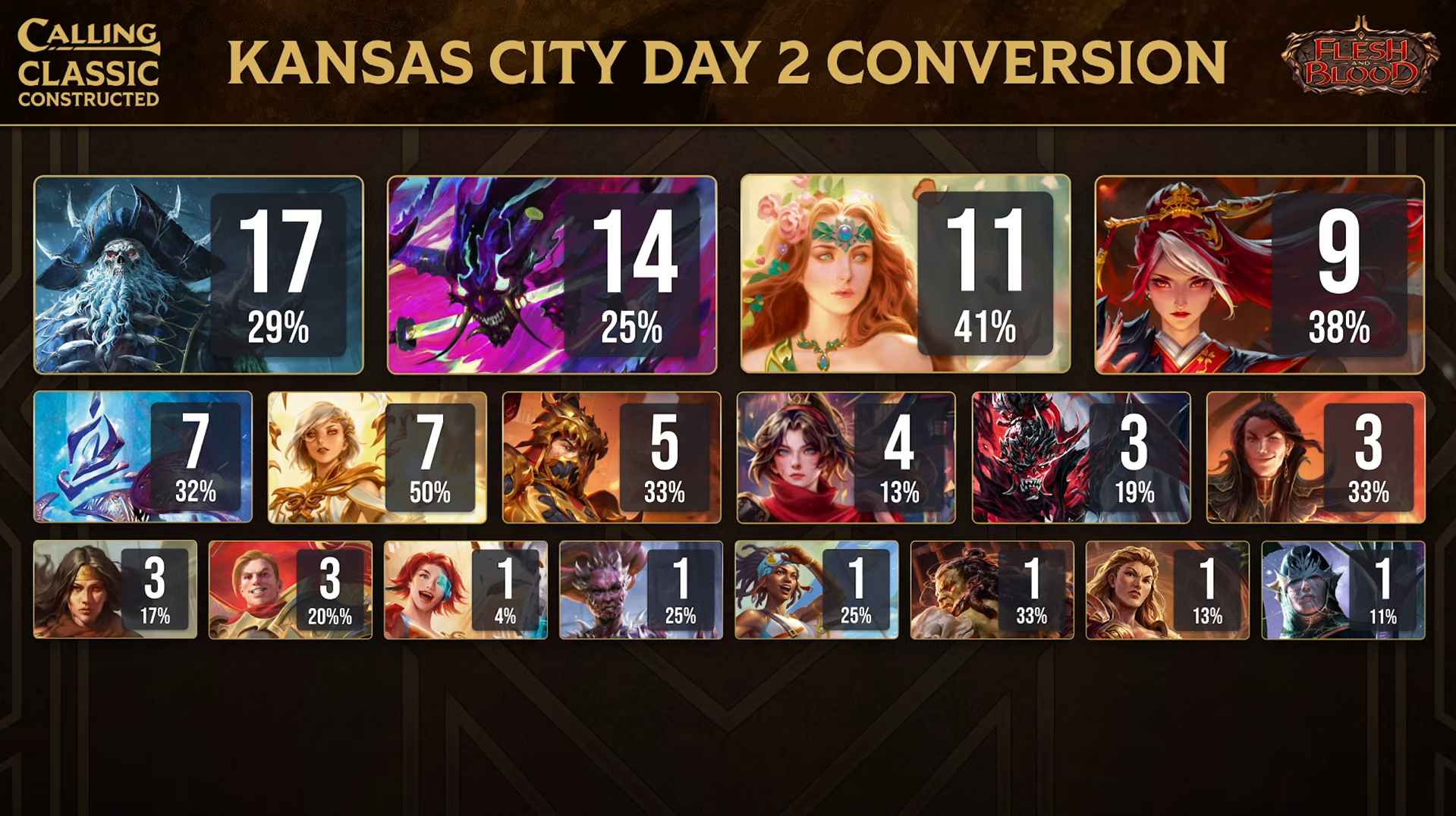
Without considering conversion rates, it can be easy to mistake one player's success - or even half a dozen players' successes - for the success of the hero on the whole.
By the metric of Day 2 conversion rate, we can see that 71% of Gravy Bones players didn't make it past the first cut. In contrast, only 59% of Verdance players fell off between Saturday and Sunday.
Often, the difference between Top 8 and the next 24 players is a tiebreaker statistic, or a single loss across 10+ rounds. These cannot be considered 'bad heroes'. At Calling: Kansas City, the Top 8 was comprised of players with 10-11 wins across 12 rounds; adding in players with a 9-3 record, the list goes to 27, and includes Oscilio, Fang, Gravy Bones, Prism, Dash I/O, Slippy, Verdance, and Ira. Only Brute, Guardian, Ranger, and Runeblade aren't represented in that.
All of this is to say that popularity matters. A lot. And while I'm the first to fall victim to the urge to go hipster on my locals, it's not fair to fault people for liking something that other people like. Usually, if a lot of people like something, it's for a reason. Take Gravy Bones, for example.
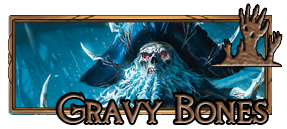
Objective reasons to like Gravy Bones:
- The first hero in the long-awaited Necromancer class.
- An approachable and well-designed Armory Deck, available upon release.
- A board-building ally deck, to fill the void left in Illusionist mains' hearts.
- An undead pirate is a cultural touchstone for those of us who loved the Pirates of the Caribbean franchise.
- Has a wide collection of marvels and otherwise collectible variants, enticing those who like to show off their bling.
- Found early success in the opening weekend for High Seas, which remains the most recent draftable set.
- As a result, has had the attention of many top tier players and benefits from their work refining decklists.
That last point is really important, because it's a constant across all popular heroes found at the top tables: there's a self-reinforcing cycle to a hero's play rate and success. When a hero wins a major event, it validates them in the eyes of many players; and if you even had a casual interest in that deck, now you're taking it a little more seriously. This, in turn, leads to more players playing the deck. When more players play the deck, it tends to win more events (even if only because there are more entries). More wins mean more faith in the deck, etc. etc. You see where this is going.
There's a self-reinforcing cycle to a hero's play rate and success.
Undeniably, Gravy Bones is a strong deck - it's hard to sustain popularity without competitive expertise. But the degree to which a deck is more competitively viable than others in any given meta is usually less pronounced than the popularity would suggest. There will always be a 'best deck in the format', especially in the age of online testing and next-day decklists. The community ire toward Gravy Bones is strongly correlated with his play rate, just as it was with Aurora and Nuu only months ago.
Loathing
There are two distinct layers to the Flesh and Blood meta: the wider competitive scene of Pro Tour events, and the localized scene of your Armory. Oftentimes, the Pro Tour meta is dynamic and reactive, while the Armory scene is predictable and quirky. In the Pro Tour meta, a win by Verdance one week might mean a boom in Verdance's play rate the next - along with a corresponding respect for arcane damage in every other hero's sideboard! This happens not only because top tier players are aware of the dynamics of popular trends - the self-reaffirming cycle of 'success increases representation increases success' that I noted above - but also because the players who attend these events can justify the cost of switching decks. There are very real dynamics that disincentivize switching heroes frequently: time required to acquire missing cards, money spent on them, and skills honed on novel strategies.
And so, at the local Armory, you're much less likely to see the volatile impact of trends. In fact, I bet most of us could sit down and list out all the heroes we're likely to see at our next event, and who's going to be playing them. Owen will run Oscilio, Jacob's on a Warrior or Prism, Dalton's playing Kassai, Wyatt's loyal to Shadow and Runeblade, and Ivy's just taken up Ira. Because of this higher level of predictability, you have the opportunity to learn the matchups, improving and adjusting week after week until you've found your pathway into that opponent. And while the upper echelon of competitive play may not have occasion to struggle into Riptide, for example, you may have a local player who's refined their gameplay on him to the point where he's the biggest threat you face week in and week out.
Unfortunately, most of us spend significantly more time engaged with the global Flesh and Blood community than the local one. Our opinions on decks and heroes is often shaped and solidified based on the dynamics, performances, and popularity of the players at the top, and we bring those opinions to bear on our local scene. "Gravy Bones is overpowered and overplayed", we repeat - whether that's true of our own experience at the Armory or not.
Most of us spend significantly more time engaged with the global Flesh and Blood community than the local one... and we bring the opinions formed there to bear on our local scene.
Cut to the new player, who joined up just as High Seas was releasing and excitedly scooped up the Gravy Bones Armory Deck, throwing all their trade assets (and a not-insignificant amount of cash) into building a respectable semi-budget version of the deck. Thus far, most of their FAB skills have been learned within the context of Pirate Necromancer, and there's not even another hero in the class to fall back on as talk gets increasingly hostile toward their chosen hero. (Yes, Pirate is a class, but it's disingenuous to say it's easy to pivot into Puffin or Marlynn with Gravy Bones' card pool.) What's worse, this player is not getting 'overpowered' results out of this deck, and yet you're on the other side of the match complaining about the strength of board state heroes as you once again deal them a defeat.
Simultaneously, that player is receiving two messages:
- My deck is annoying the group, and
- I'm not even good enough to win with it.
These two streams both feed into a feeling of self-loathing, and can ultimately impact that player's desire to return next week. Alternatively, it can push them to play something different at a time when they really should be getting in reps and focusing on growth, not adding new variables. (I'm a firm believer that everyone should start their FAB career as a specialist.) Meanwhile, you're actually benefiting from their playing this overly-popular, overpowered hero: because they're guaranteeing a weekly presence of the 'top deck in the format', you're able to get reps into it, learn its playlines, and most importantly, test and discover your own avenues for success into it.
Because I Knew You...
If there's one message I hope you retain from this article, it's this: the discourse of the wider Flesh and Blood community online is seldom good for the local FAB community at your shop. Community-building is intentional, and it requires that you think about the players as much as the game.
LSS illustrated their understanding of this dynamic during their Dev Talk on the Aurora LL situation. While the community had been bloodthirsty for Aurora's rotation - a welcome respite from her omnipresence at the tournament tables - Bryan Gottlieb and James White projected sympathy and a certain element of shame over the experience of Aurora fans. They recognized that, for many, Aurora was the hero they learned the game with; she resonated with them in her aesthetics, theme, and gameplay; and as they began to notch wins, they'd had to stomach the irritation of their opponents and a fast-approaching end to their tenure with her. They knew this was not an experience likely to retain these young FABsters - at best, it would leave a bad taste in their mouths.
The discourse of the wider Flesh and Blood community online is seldom good for the local FAB community at your shop. Community-building is intentional, and it requires that you think about the players as much as the game.
Aurora was strong, and Aurora's play patterns were direct and - for lack of a better word - 'simple'. These are beneficial attributes when you're pairing a deck with a new player! And in truth, that makes the games more engaging for veteran players too. Rather than slowing down or holding back in our games with inexperienced recruits, we can find ourselves challenged by the deck itself until the player's skills have had the opportunity to catch up with the deck's power.
I think most of us know that, and I think few of us resent that. But our words don't always reflect that.
So how do we do better? How to we ensure that our attitudes and comments build up our local scene, rather than corrode it? Let me suggest a few guidelines.
- Encourage your locals. It's fair to advise a newer player that Maxx Nitro is not the most relevant hero in the wider meta, but locally, there's little reason to discourage their playing a hero that appeals to them. On the flip side, if you have a novice who's gone all in for Gravy Bones, regardless of how you may feel about the hero, encourage them to keep honing that deck and recognize it as the opportunity for your own growth and refinement that it is. We all have a vested interest in our local scene getting better, and our local players enjoying themselves.
- Remember the context. At most Armories, the stakes are low, and winning may not even be related to prizing anymore. If you take a hard loss, that may not be a positive experience for you, but it doesn't have grave consequences; let it roll off your shoulder, and don't use it as justification to air your grievances - especially at the expense of your opponent's experience of a win. Remember that this person at your shop is not the responsible for the Pro Tour you watched last weekend (unless you've got Pro Tour finalists at your local shop, I suppose).
- Consider your topics. Like hosting a party or gathering with relatives, you have a stake in the tone of the event. There's nothing wrong with letting discussions free flow between friends, but be on guard for branches into unfriendly waters. For example, the resentment toward Nuu was a particularly dark era in our community, and while many players struggled to learn the complex gameplay of Assassins, they were simultaneously taking collateral fire in the court of public opinion for the skill expression seen from Nuu players at Pro Tours. You want your topics to build up, not bog down!
- Follow your local trends. They're much more relevant than the global trends. If you're borrowing decklists from Pro Tour contenders without modifying them for your local meta, you're teching for the wrong stuff. You're also probably wringing your hands and skewing your build based on answering decks that don't appear with the frequency (or skill level) that merits that. While Guardians have struggled in this Gravy Bones meta for their inability to go wide, your local scene may not present the same challenge. Similarly, if you're having a problem with oversaturation, be the change you want to see: switch to another deck!
I cannot emphasize enough that the needs of your local scene are distinct from the needs of the game at large - and you are in the best position to not only know what those needs are, but to address and answer them. If Gravy Bones is legitimately causing problems for your local scene, don't slag on the players who run him; instead, use what you know about those players to determine why they're contributing to your problem, and if it's truly something that can (and should) change, address it with them. And if Gravy isn't causing trouble for your Armories, don't take his larger meta share so personally! Every hero, every deck, is a player, and every player is important. Don't vilify them by proxy.




